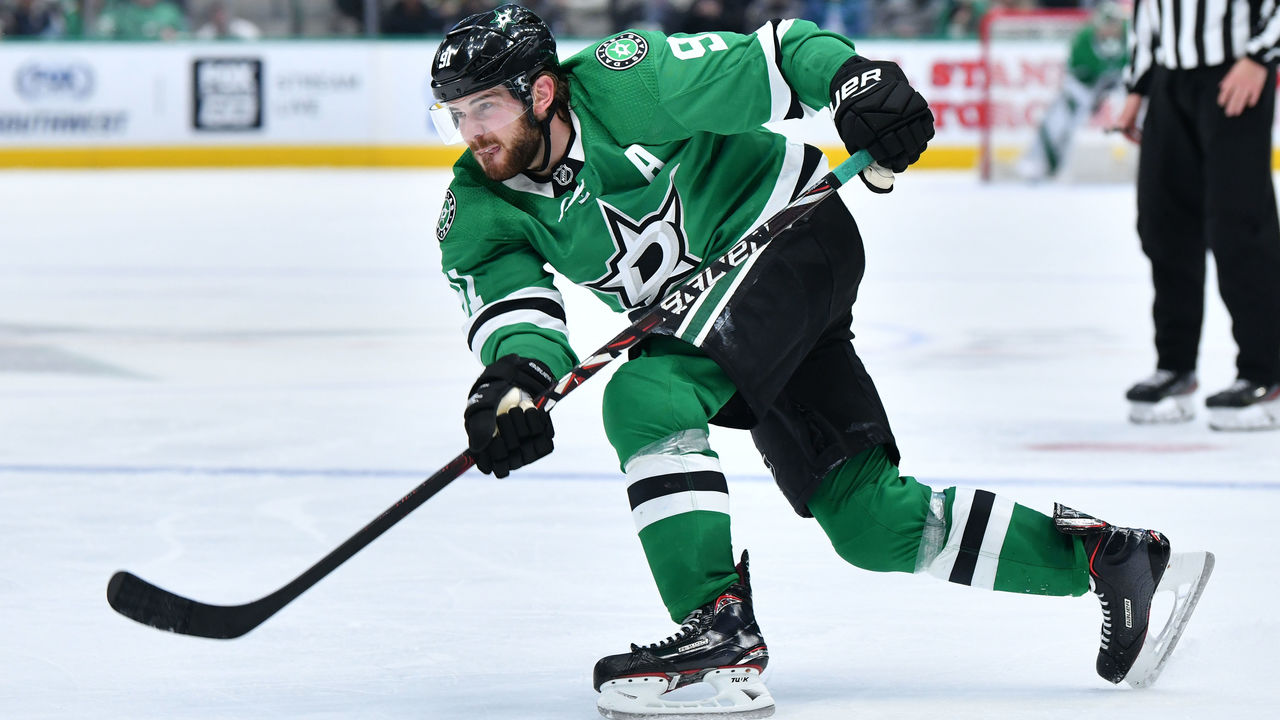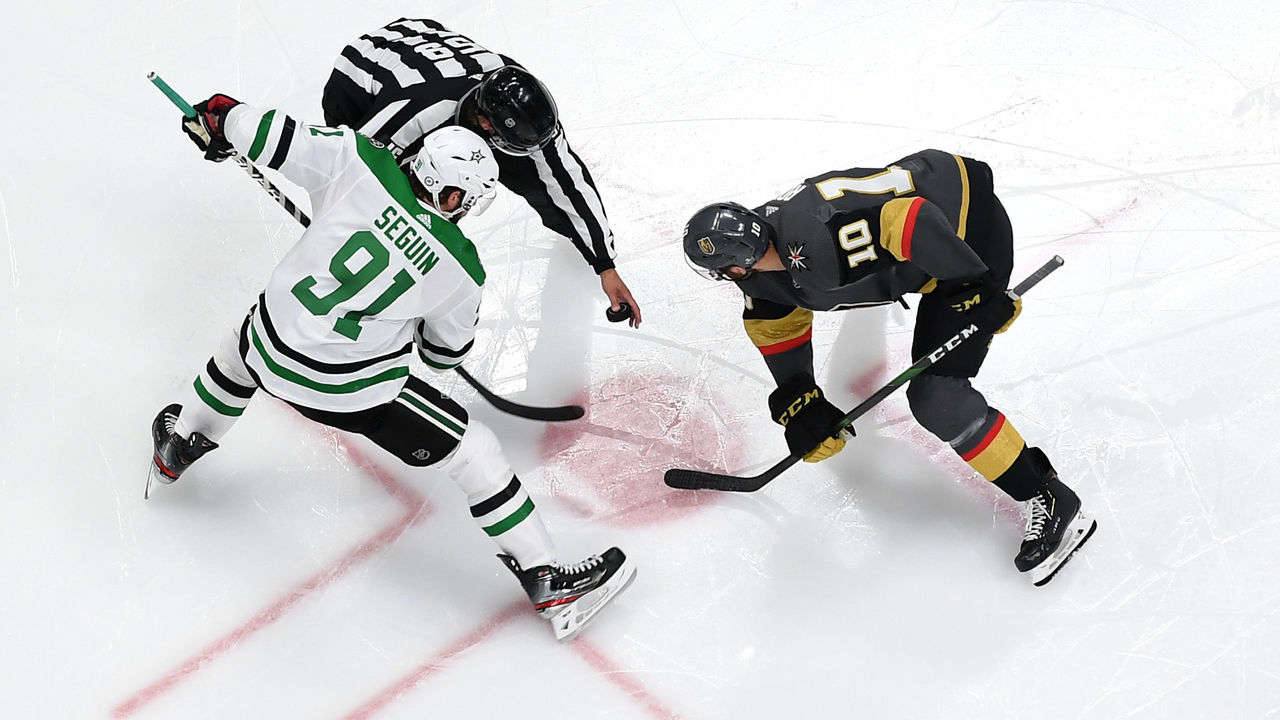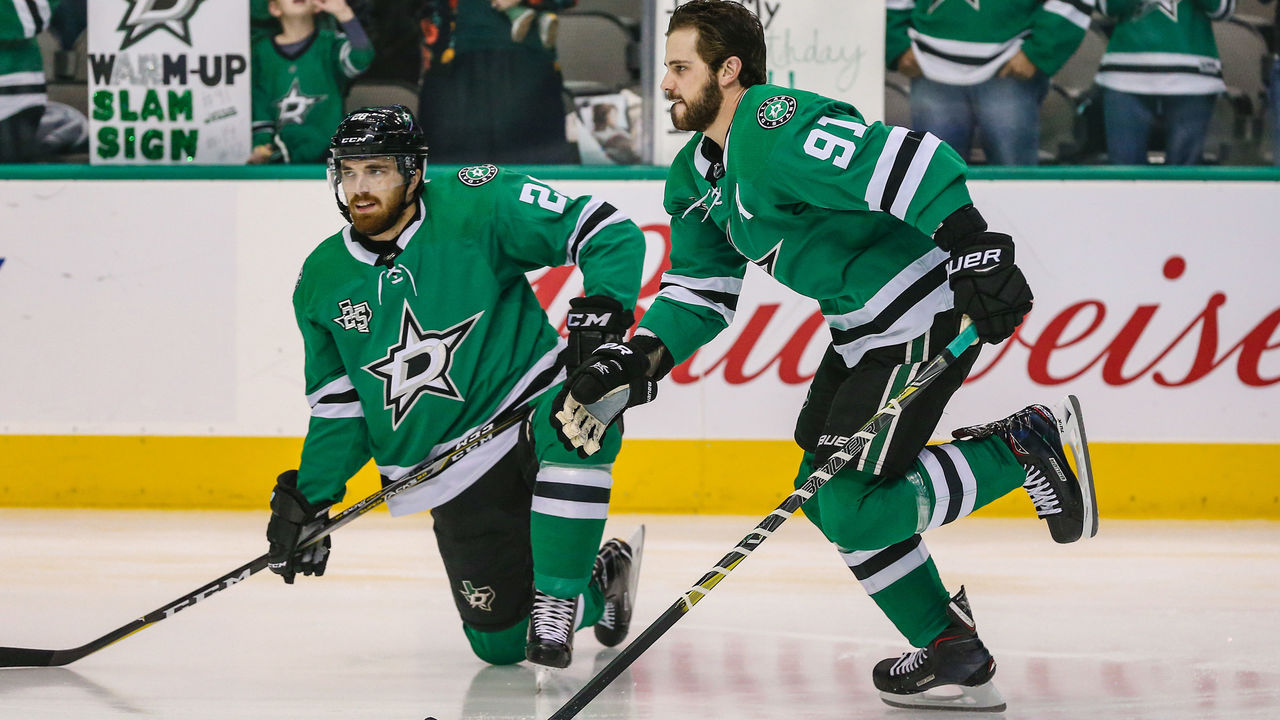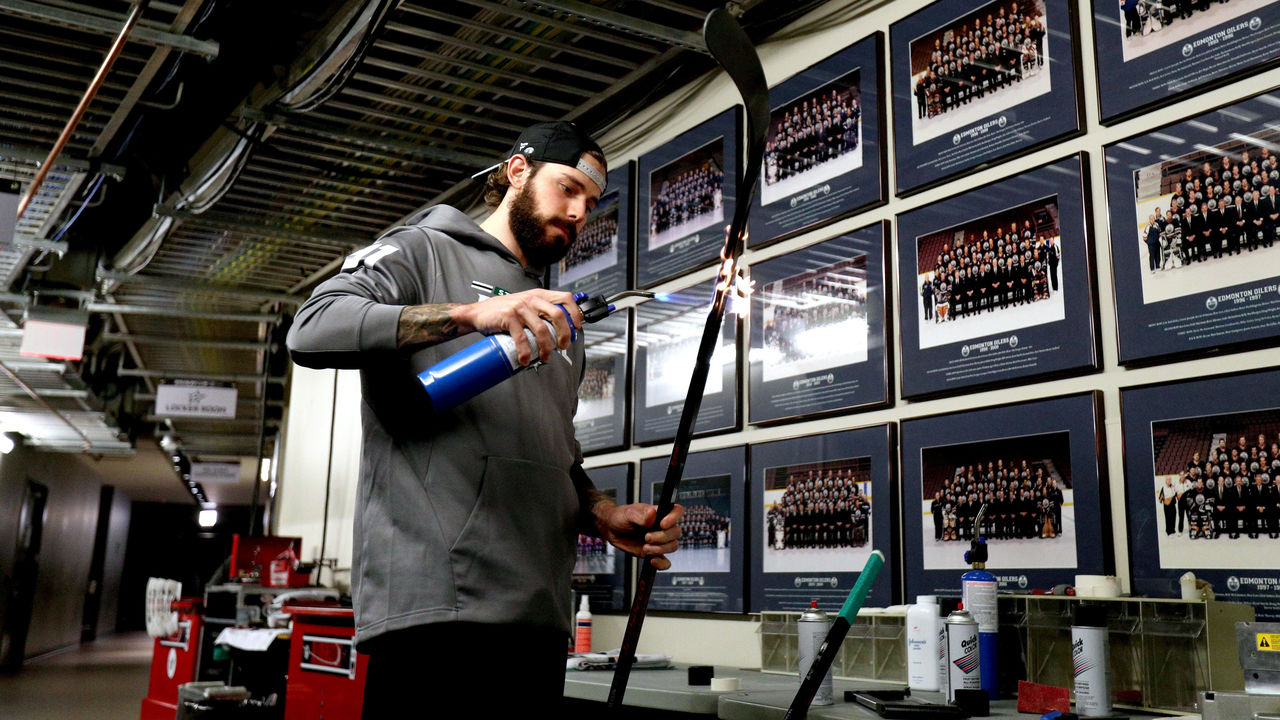Seguin on mental health, Corey Perry, entrepreneurship, and NHL TV deal
Tyler Seguin isn't your typical, cliche-dishing NHL player. Rather, the Dallas Stars veteran is a rare professional athlete who seldomly speaks in platitudes.
Yet, one cliche works perfectly for the 29-year-old at this stage of his life and career. It goes like this: You don't realize what you've got 'til it's gone.
"One-hundred percent. One-hundred percent. One-hundred percent," Seguin replied, seemingly nodding in agreement when theScore recited the bumper sticker-worthy saying over the phone.
Seguin, the second overall pick in the 2010 NHL Draft and a five-time 30-goal scorer, is comfortable attaching himself to the cliche because he's dressed for only three meaningful NHL games since last August. He misses competing.

A durable, point-producing forward since 2010-11, Seguin appeared in 741 of a possible 773 regular-season games in the first 10 seasons of his career. In 2020-21, however, he was sidelined for 53 of 56 contests to recover and rehabilitate after undergoing a hip arthroscopy and labral repair last November and a knee scope one month later. In all, it was a treacherous six-month rehab that involved Seguin having to painstakingly "rebuild" his right quad.
By the time Seguin returned to the lineup in May, the 23-19-14 Stars were well on their way to finishing fifth in the Central Division. Dallas failed to earn a playoff spot despite making the bubbled Stanley Cup Final the year prior.
With so much idle time on his couch, Seguin turned his attention to his off-ice pursuits. He became one of the first NHLers to sell personalized non-fungible tokens; modeled as a brand ambassador for a cologne named "Sexual Noir Pour Homme"; worked away at his Nine One lifestyle brand; and, most recently, launched a dog toy and treat company called The Chew Club.
In an interview on Tuesday, Seguin discussed the recovery process, business interests, a couple of ex-teammates, the 2022 Olympics, and much more.
(Note: The following conversation has been lightly edited for clarity.)
It was a crazy past season for you with the surgeries and rehab, then a brief return to action. What are you up to at this point in the offseason?
I'm in Dallas. Once our season ended, I took off, I don't know, probably six of seven days of training, and then I went right back at it as far as working out and rehabbing. I don't know if I would call what I'm doing today rehabbing or working out. It's kind of a hybrid. Here in Dallas, I'll do my rehab/working out while the other guys are doing a lower-body lift, and on the upper-body days and core days, I'm doing the same workouts as the rest of the guys. Things have been progressing really well. I'm really happy with where I'm at right now, and I still have to take advantage of the next few months off here before it's go time as far as continuously strength-building my quad and my hip post-surgery, but I love the progress, where I'm at. It's exciting times. I've gone on the ice a few times lately, and if I remember where I was the first few times I went on the ice before I came back for a few games, I'm light years ahead.
Do you think you'll be at full health, 100%, on opening night in October?
That's the plan. If not, I don't think I'm a month or two off from being 100% after that point. So, I'm just going to keep working and hope for the best.

Such a difficult year can really test an athlete, a person. How much has your perspective on hockey and life changed over the past year or so?
A lot. It's funny, I feel like you have interviews throughout your career where you say that, but I feel like this is the first time I can actually mean it when it comes to perspective on, like you said, hockey and life. Plus, tying in all of the COVID-19 stuff, and things going on in the world, and being injured. It's been some wild times, but I'm really happy with where I am - especially mentally after everything. I had some dark days and dark weeks of just being in that grind, not being able to do too much in the gym, just slow methodical things that taught me pretty valuable lessons. I've had many surgeries throughout my career - well, I haven't had many, but I've definitely had a few - but none as grueling as this, none where I had to then go back under the knife a month after a major surgery with some knee stuff. It's definitely a process that I'm going to look back on for years.
Some fans seem to believe pro athletes are immune to mental health struggles. Clearly, that's not true. What have you learned on that front?
Two things with athletes. One, we have amazing perks being a professional athlete. There are things in life that a regular person wouldn't be able to do that we get to do, and 95% of what other people get to see from our lives are those perks. The other side of athletes is that we're human beings, and we go through struggles, and we have things that happen away from the rink that people don't know about - off-ice stuff, family, friends, whatever. We're still human beings. But, definitely, when it comes to the injury side, it's really a whole different ball game that people won't quite understand. There's the physical side and the mental side of not being able to be around your teammates, which is something that your mind and body are so accustomed to. Being on plane rides, playing cards - you know, day-to-day stuff that a regular person wouldn't quite understand. And they might say, 'Well, who cares, it's not that big of a deal.' But it is to us. Especially the mental side of watching games, and being close or being in overtime or losing games in shootouts, just knowing there are different times in the games where you'd be helping your teammates and your brothers, but you can't. It's tough to get used to that, to get over it, and it's something that teaches you to appreciate the game. I obviously have always loved hockey, but I didn't actually know or get my eyes fully opened to how much I really do love this game and love this life until I got hurt this time. I really didn't appreciate what I had until it was gone.
Your old teammate Stephen Johns, who retired from the NHL earlier this month due to post-concussion symptoms, has turned a huge challenge into something positive and meaningful with his #MentalMiles trip across the U.S. What can you say about how Stephen's handled the transition?
I think it's awesome. I mean, that guy has been through so much. And the hardest part for him, when he was going through everything, was not getting a proper reading from somebody to say what exactly was wrong. They couldn't really figure it out. Imagine having to go to the rink every day and say you're not playing and telling your teammates you can't go in but not really being able to explain why. That must have been so hard for him. I've golfed with him a bunch since and talked to him a lot. With everything he's gone through, I'm incredibly proud of what he's doing today. He's going to make a difference with other people, and he's in good hands on the trip with Jeff Toates there too. He did our photos and media this year in Dallas. That's two good people on a trek through the United States. They're definitely making an impact.

Meanwhile, another ex-teammate, Corey Perry, is in his third Stanley Cup Final. What's behind Perry's renaissance, these consecutive strong postseasons in his mid-30s as a member of the Stars and Canadiens?
He's just one of those players, man, where you don't look at the age. You look at his resume. When he's in those situations, he finds a way to take it to the next level. There are just guys that have that capability. You look at a guy like Joe Pavelski, too. I mean, there's a lot of people this year who probably thought he was still 30 years old. I mean, these guys, they have that tick. They have that in them, and they're fun to be around, and it rubs off on you when you start to understand their psyche and their mental side and their preparation before games, especially since they're in the later stages of their careers. 'Worm' is just a heck of a player and a heck of a person. He definitely made us better, and he's a big reason why I think Montreal's where they are.
Gary Bettman expressed concern Monday about the Olympics' impact on the 2021-22 NHL season. The league wants to honor the MOU signed with the players' association, but there are outstanding issues with the IOC. As an NHLPA member and a player who will likely be considered for a spot on Team Canada, how crushing would it be if NHLers end up not participating in another Olympic Games?
(Sighs) I mean, it's been the same question for years and the same answer for years: The players obviously want to go. As a kid growing up, when you're sitting in your bedroom when you're nine or 14 or 15 years old, you're dreaming about winning the Stanley Cup and dreaming about representing your country. The Olympics is about representing your country on the world's biggest stage and with one's heart and soul. I would love to go there, and hopefully, it works out.
So what's the story behind creating The Chew Club?
It's been a passion project. Once COVID-19 hit and once I had injuries and even in the bubble, being in a hotel room a lot, sitting in rehab for months and months, I had a lot of time to think. To say today that it's a company is pretty incredible to me. I've always been a dog guy my whole life. We've always had a Lab in the family, and now I'm going into my 12th year in the league, and I've got three dogs at ages 11, seven, and four. Being in the NHL, you're always on the road, and I'd always notice that when I came back, especially early on in their lives, a belt would be eaten, and shoes would be eaten (laughs). So I always thought of having this structure in my life, where maybe every month there'd be a new toy or new dog treats. I was always busy and always looking for help with them. But I also have always loved them as my own children. That's where The Chew Club comes in. I think it's pretty awesome. If you get a monthly subscription, every month you get a new box with toys and treats. And, you know what, dogs get anxiety. They get depressed. They get bored. Us, as athletes, we give them misreadings where in the summer we're around every day for two to four months, then, all of a sudden, when it's the season, they see your suitcase every single week, and they get confused, and they get sad and anxious. The products are also healthy. That was a big thing for me as well. And another thing I love about what we do with our product is the smell. Toys and treats tend to have a certain smell. And these are all maple-smoked, so you won't smell much, and if you smell anything, it'll smell good, which will help their breath. We've had many different flavors, different types of toys, and it all got tested through my dogs. The ones they loved are what we've put into the first few boxes. It's Gerry, Marshall, and Cash approved.
It's interesting that you aren't just a spokesperson or ambassador. You're very much all-in on The Chew Club as a co-owner from the start.
Oh yeah, I'm all-in. I think it changes with everyone's career. When I was younger, in my first, maybe, I don't know, five or six or seven or maybe eight years in the league, I loved just comparing companies for endorsements and seeing the numbers that they give you to post this or that on social media. You go with the big companies, and you do that. But you also want to figure out what you want to do later in life. You realize hockey is going to end at some point. I think injuries open you up to that aspect as well, which is something you don't fully understand when you're a kid in the league and living your dream. So, a lot of my business now, I guess you could say, has been transferred from endorsements to equity, and then now, with this company, being an actual owner. I'm having a lot of fun with it, and I'm definitely wearing my heart on my sleeve with this one. So, hopefully, people like it.

Reading between the lines - and I swear I'm not trying to retire you here - you'll head right to the business world when you're done playing?
I've always wondered what I'd be doing next, and a big thing that's happened as of late, really, is that once COVID-19 hit, before I went into the bubble, I started learning a lot more about business. I found a lot of my days were spent in my office, studying different things and talking to different people. Now I have another property elsewhere. There's also networking and getting into the golf world. Business just seems to, I don't know, make me excited and make me happy, and I have a lot of fun with it. Now, with me having my own company, I'm trying to understand things, whether it's how to market something or figure out what makes this toy better than the next toy or what makes this treat healthier than the next treat. I find a lot of joy in that. That's why, for sure, when I'm done, I'll be doing something along these lines.
You mentioned the length of your career. Over the course of it, I feel like hockey culture has come a long way with respect to accepting different personalities, players who have outside interests. Would you agree?
I keep hoping that we continuously go on that path. I love some of the young kids coming in now with a lot more swag. I look back on even Auston Matthews and Mitch Marner in Toronto and how they came in, and they just had the swag and fashion. Of course, P.K. Subban's great at what P.K. does. I try to put my own spin on it, as well. I'm a guy with a lot of tattoos and a flair for personality. It may have gotten me in trouble early on in my career, in my first few years (laughs). But it's accepted a lot more now, which is great. You can speak your mind a little bit more versus doing the typical 'get pucks in deep' and 'roll four lines.' Typical cliche answers. So, it's exciting. Hopefully, with us going over to ESPN with the TV deal, we can continue to show that. I don't think we can get to the NBA's level, but hopefully, we can continue to stay on that path of being outspoken people who aren't going to be complete idiots but can at least show a little personality.
OK, one follow-up as I let you go. In general, what did you think of the new TV deal in the U.S., with ESPN and TNT coming aboard?
I loved it. I thought it was great. I think it was a great first step for our league, and now the players have to back it up with being able to be themselves and not fall too much into the typical structure of an old-school hockey player.
John Matisz is theScore's senior NHL writer. You can follow John on Twitter (@MatiszJohn) and contact him via email ([email protected]).